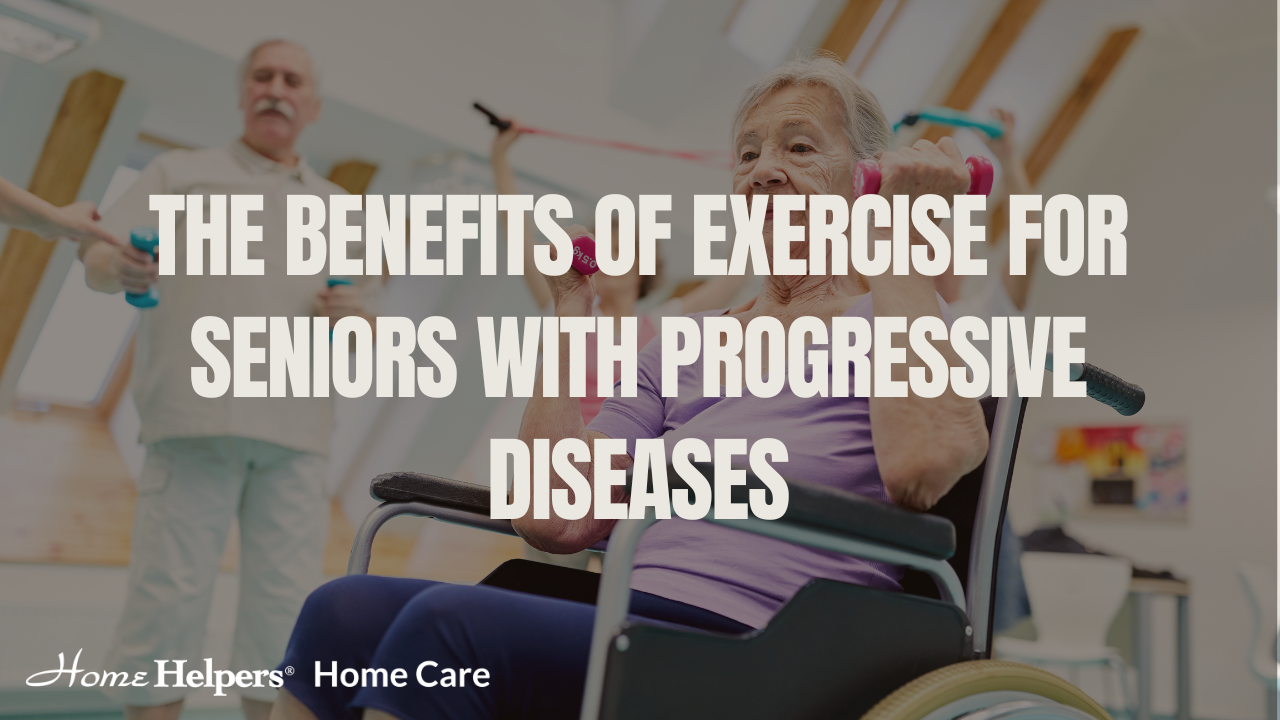The Benefits of Exercise for Seniors with Progressive Diseases in Martinsburg, WV

Author: Home Helpers Martinsburg
Exercise is essential for maintaining physical health, enhancing mood, and improving overall quality of life—especially for seniors in Martinsburg living with progressive diseases like dementia, Parkinson's, and multiple sclerosis. Regular physical activity can help manage symptoms, increase strength and mobility, and support mental well-being. Here’s how exercise benefits seniors with progressive diseases and some tips for incorporating it into a daily routine.
1. Improving Physical Health
Regular exercise helps seniors maintain cardiovascular health, build muscle strength, and improve flexibility. Whether enjoying a walk through War Memorial Park or participating in light resistance training at home, staying active can help control weight, reduce the risk of chronic conditions, and increase overall stamina.
2. Enhancing Mobility and Balance
Preventing falls is key to maintaining independence. Activities such as walking, tai chi, and balance exercises improve coordination and strengthen muscles and joints—crucial for safely aging in place.
3. Managing Symptoms of Disease
For seniors with progressive diseases, exercise can play a critical role in symptom management:
- Dementia: Can support cognitive function and slow cognitive decline.
- Parkinson’s Disease: May reduce tremors, improve gait, and enhance motor skills.
- Multiple Sclerosis: Can ease fatigue, boost strength, and improve mobility.
4. Boosting Mental Health
Exercise supports mental well-being by reducing symptoms of depression and anxiety, lifting mood, and boosting self-esteem. Physical activity releases endorphins—natural mood boosters—and can offer a daily sense of purpose.
5. Promoting Social Interaction
Group exercise classes or walking with a companion are great ways for seniors in Martinsburg to stay socially engaged. These interactions reduce feelings of loneliness and provide much-needed emotional support.
6. Enhancing Cognitive Function
Activities that combine physical movement with mental focus—like yoga, dancing, or gardening—stimulate the brain and help preserve cognitive abilities.
Tips for Incorporating Exercise into a Daily Routine
- Start Slowly: Begin with low-impact movements.
- Set Realistic Goals: Achievable goals build momentum.
- Find Enjoyable Activities: Choose enjoyable options like walking, stretching, or gardening.
- Incorporate Variety: Alternate between cardio, strength, and flexibility work.
- Stay Safe: Use proper technique and seek assistance if needed.
How Home Helpers Home Care of Martinsburg Can Support You
At Home Helpers Home Care of Martinsburg, we help seniors stay active and safe with personalized care that meets their unique needs. Our services include:
- Personalized Exercise Plans
- Supervised Exercise Sessions
- Motivation and Encouragement
- Companionship During Activities
We believe movement supports independence and quality of life—and we're here to help make that possible.
Conclusion
Exercise provides countless benefits for seniors with progressive diseases, from strengthening the body to uplifting the spirit. If your loved one in Martinsburg could benefit from compassionate care that supports an active lifestyle, Home Helpers Home Care is here for you.
Visit our website or contact our office to learn more about how we can help.
#HomeHelpersMartinsburg #SeniorExerciseSupport #WeAreHomeHelpers
Sources:
- Alzheimer’s Association. (2023). Exercise and Physical Activity. www.alz.org
- Parkinson’s Foundation. (2023). Exercise and Parkinson's. www.parkinson.org
National Institute on Aging. (2023). Exercise and Physical Activity for Older Adults. www.nia.nih.gov
